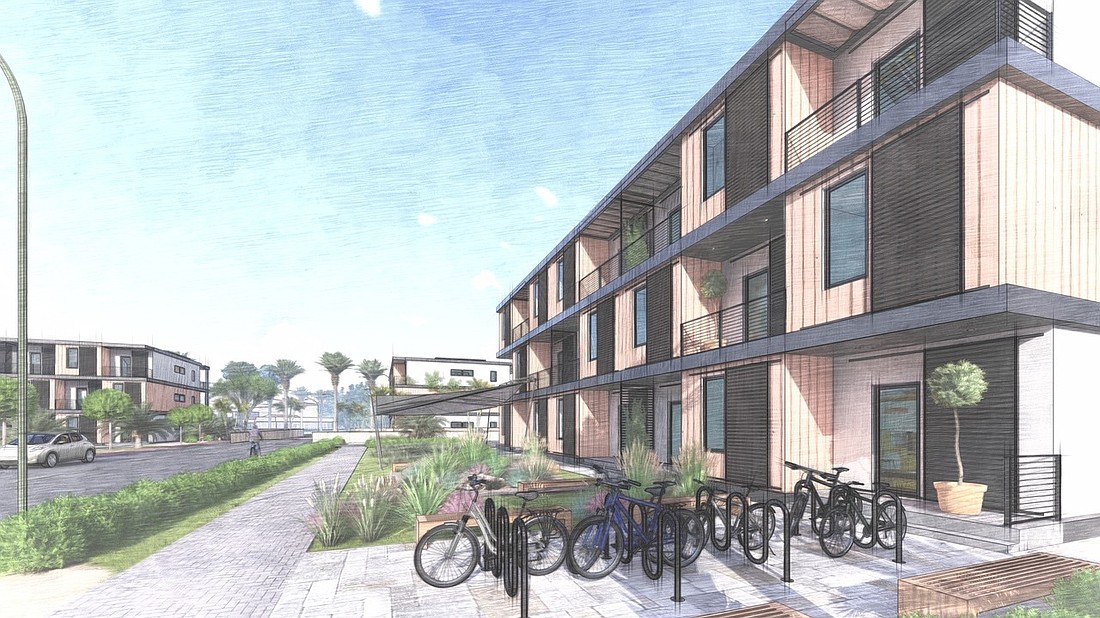- July 26, 2024
-
-
Loading

Loading

Developer Marshall Gobuty and his Sarasota-based company, Pearl Homes, are actively working to change something that's a hot topic in many cities and states nationwide: filling the demand for housing, affordable and otherwise.
One big attempt at a solution is in Ellenton, north Manatee County, where he’s planning a community of 720 sustainable rental residential units on 160 acres to appeal to a variety of demographic groups, from millennials and veterans to working professionals to 55+ retirees. He also wants the community, under the brand name OurLives, to appeal to members of the workforce, such as teachers and firefighters, who have been priced out of other housing options.
‘The only way to get affordable to work is to get economies of scale.’ — Marshall Gobuty, Pearl Homes
Pearl Homes is busy on other projects to combat housing shortages, including a 200-unit project and a 36-unit development in Bradenton, which Gobuty aims to have under construction by June or sooner. He also plans to build these modular apartment units in California — a state well known for housing challenges.
Designing a housing unit both sustainable and affordable is challenging, Gobuty says, and there are more obstacles ahead, including building a community people want to call home and scaling the business. The OurLives community is part of a larger goal Gobuty has to build 6,000 units over the next four years. He says, “The only way to get affordable to work is to get economies of scale.”
Plans for OurLives have received some approvals from Manatee County commissioners, and the plan will face another vote in February. Gobuty describes the project as a blank canvas and an opportunity to create a new housing model. “It’s not just density, it’s not just how it looks — it’s creating a community,” he says.
OurLives will include studios along with one-, two- and three-bedroom units. Pearl Homes decided to rent the units instead of selling them because Gobuty says if they were built to be sold, the prices would have to go up, and the company’s focus is on creating an affordable product. Rents for units at OurLives will range from about $1,040 to $1,200 a month.
Pearl Homes also plans to keep prices lower at OurLives through the use of its modular housing units that will be partially built in factories and partially on site. Factories would pre-fabricate some components, and Gobuty says the company plans to experiment with the percentage of pre-fabricated versus on-site work. He expects the division to be about 50-50 at first. “We still want to keep our local trades busy, but we want to do it so we’re not at a prohibitive price point,” he says.
Another market advantage? OurLives will offer something different than other rental communities on the amenities front. Instead of spending big dollars on the construction and maintenance of a pool, gym and other traditional amenities, Gobuty wants OurLives to take advantage of its commercial space by filling it with practical, convenient amenities in the form of tenants such as a coffee shop or a dry cleaner. “That’s an amenity if you live there,” he says. “You should be able to get what you need without leaving.”
He and his team also want to make use of neighboring businesses by offering residents memberships and discounts, including a membership to a nearby gym. “Why not try to use what’s in the community?” Gobuty says.
Another way Pearl Homes plans to reduce costs and create economies of scale is by not building custom units. “We have a handful of options so we’re not reinventing the wheel,” Gobuty says.
Along with affordability, there’s another ambitious element of the project: the structures will be solar powered and Zero Energy certified. Sustainability is important to Gobuty — in late 2019, the U.S. Green Building Council recognized Pearl Homes for creating a Leadership in Energy and Environmental Design (LEED) Zero Energy home, which Mahesh Ramanujam, president and CEO of USGBC, called the first LEED Zero single-family home in the world. The designation is for spaces that have a source energy use balance of zero over a period of 12 months.
At OurLives, plans also call for promoting sustainability through community gardens, composting and recycling.
Gobuty expects to break ground on OurLives about a year from now, in early 2021. He’s sticking to his ambitious plans for thousands of new sustainable — and affordable — housing units in the coming years. Without a high bar, he says, he and his team won’t be able to make a dent in the demand. “When you do something new, it’s not easy,” Gobuty says. “I think we’re on to solving a huge socioeconomic problem.”